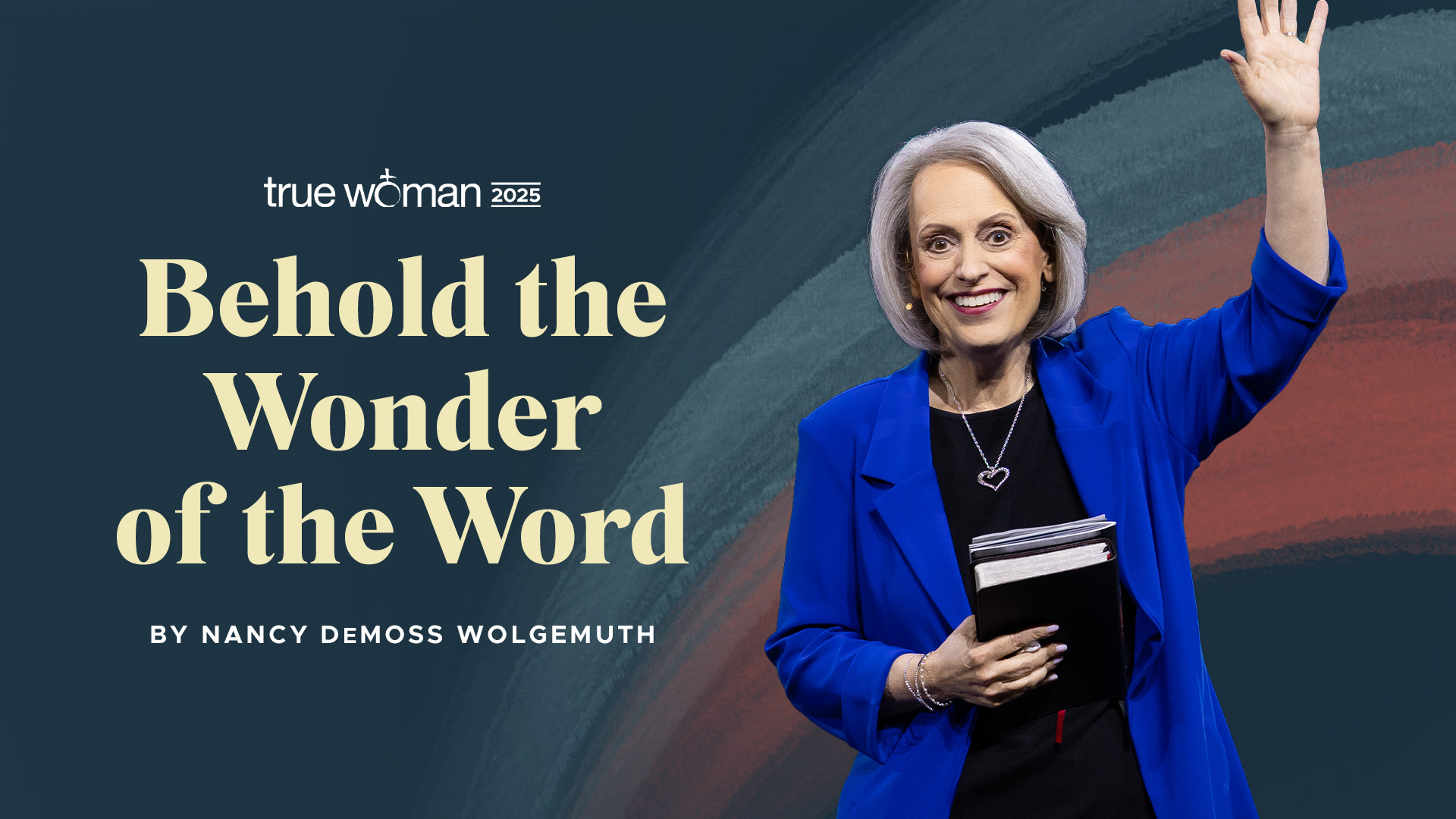
Dannah Gresh: About a month ago, Mariya Gusenkov heard a conference message about savoring and delighting in God’s Word. She had been reading the Bible already. But she came away wanting to enjoy it even more.
Mariya Gusenkov: I really love how we heard during the conference that the appetite is not like physical appetite you eat and you get satisfied. With the the appetite for the Word is something that is only growing, so come and taste and see. So I’m in that stage where I’ve tasted. That is so beautiful, and I want to have more
Dannah: You’re about to hear one of the messages Mariya heard at that conference. As you listen, I think your longing for God’s Word is about to grow.
This is the Revive Our Hearts podcast with Nancy DeMoss Wolgemuth, author of A Place of Quiet Rest, for November 3, 2025. I’m Dannah Gresh.
What is the most delicious thing you’ve eaten in . . . oh, let’s say the past month? I’ll bet you still remember what it tastes like, and I’ll bet you wish you had more of it right now.
Well, I know that food was delicious. But you know what? Today you have the opportunity to taste something even better!
Nancy DeMoss Wolgemuth is about to tell you what it is. Today and tomorrow, we’ll hear the talk Nancy recently gave at the True Woman ’25 conference. The theme was, The Word: Behold the Wonder.
The women who attended came away ready to savor the Word of God, and I think you’re going to have that same delectable experience. Let’s listen.
Nancy DeMoss Wolgemuth: Some time ago I was staying in a friend’s condo, and she had a lot of books in the condo. I was looking around at them, and I saw a book that was edited by an English lit prof, a literature teacher. It was called 1001 Books You Must Read Before You Die. That book included classics like Arabian Nights, War and Peace, Little Women, and many books you’ve probably never heard of. But I was astonished to see that in that list of a thousand and one books that you must read before you die that there was no mention of this book [the Bible]. How is that possible?
Now, the Bible did make another list. It was an essay written in a popular magazine and the essay was called “21 Books That You Don’t Have to Read.” It said that many of the classic books that we’ve been told are must reading are really overrated, and they’re not worth reading. That list included books like: The Adventures of Huckleberry Finn by Mark Twain and The Lord of the Rings by Tolkien. But that list of twenty-one books you don’t have to read also included this Book, the Bible. It said, “there are some good parts.” That’s nice. “But overall, it certainly is not the finest thing that man has ever produced. It is repetitive, self-contradictory, foolish, and at times ill-intentioned.”
Now, ladies, as Christians, we are people of the Book, this Book. And this weekend, we’re asking God to give us a fresh sense of the wonder and the sweetness and the beauty of His Word. And I can’t think of a better passage to help us do that than Psalm 119. It’s right in the middle of your Bible. This is the longest chapter in the Bible. I’d love to just read the whole thing. I won’t do that tonight. It has 176 verses.
I have a friend who when he was growing up said that his mother used to read the five children in that family, five chapters of the Bible every night. Their dad traveled a lot, was out of town, and the mom would read five chapters of the Bible to those kids every night. And he said, “When Psalm 119 came, I thought eternity had come.” (laughter)
I read about a seventeenth century minister who was condemned to death by hanging. And the custom in that day was that condemned men were allowed to select a psalm to sing. This man chose Psalm 119 to be sung around his execution. And before the psalm ended, a messenger arrived bringing a pardon, the news that his life had been spared. It turned out the man knew that the pardon was coming. He had intentionally chosen Psalm 119 as a stall tactic, and saved his life.
Let’s look at a little overview of Psalm 119. Perhaps you are new to the Christian faith or you’ve never taken time to study this psalm. Let me just give you just a little background.
It’s what we call an acrostic poem. There are twenty-two stanzas, and you’ll see these marked in your Bible. Each one has eight verses. In the first stanza, each verse, each of those eight verses begins with the first letter of the Hebrew alphabet. In the second stanza, each verse of that stanza, each of those eight verses begins with the second letter of the Hebrew alphabet. And so on through all twenty-two letters of the Hebrew alphabet. It’s a literary masterpiece.
One commentator said that “Psalm 119 is an alphabet of prayers and reflections on God’s Word.” Another commentator said that “Psalm 119 is the Mount Everest of the Psalter of the Psalms.”
Well, I can tell you this about Psalm 119. There is no way we are going to reach the summit of this Mount Everest, this side of heaven. But tonight we’re going to pull over into just a few scenic overlooks. You know, when you’re driving up a mountain and they say scenic overview or overlook, and you can pull aside and you can see the beautiful scenery. I want to give you just a glimpse of some of the amazing views in Psalm 119. It’s what one writer has called “the mind-blowing beauty, the sin-killing power, and the breathtaking expanse of God’s Word” is the theme of this psalm.
Now, I’ve been listening to and reading Psalm 119 on repeat for a long time. Robert and I had the chance to do this yesterday and this morning in our hotel room, just to listen to it being read aloud. And each time it’s freshly sparking my heart and my love and affection for God’s Word.
One of the things you’ll see as you read this psalm is that the psalmist’s life . . . And by the way, we’re not told who the author was of this psalm. Some think it may have been David, some think Daniel, some think Ezra. Those are all good possibilities. We don’t know, but the psalmist, his life is tethered to and governed by God’s Word 24/7. In fact, look just a moment at verses 147 and 148. You have to flip over a few pages. This will give you an example.
I rise before dawn and cry out for help;
I put my hope in your word.
So this psalm is for early risers. God’s Word is for early risers. And then verse 148:
I am awake through each watch of the night.
So that’s for the night owls and the insomniacs among us. I put Robert’s initial next to 147 because he’s the one rising before dawn. And I put my initial next to 148 because it’s during the night watches that I’m usually awake thinking about these things. It’s for all hours of the day and of the night.
Apart from the first three verses, the entire psalm is a prayer. The psalmist talks to God about His Word. And there are eight synonyms you’ll find used for the Scripture throughout this psalm. They’re repeated numerous times in the Christian Standard Bible, which I’m using tonight. You’ll see God’s Word referred to as: the instruction of the Lord, the decrees of the Lord, the ways of the Lord, the precepts of the Lord, the statutes of the Lord, His commandments, His judgments, and His promise. And each of those words gives us a slightly different window into the multifaceted splendor of God’s Word.
Most of the verses in Psalm 119 fall into at least one of four categories. I’m going to give you these just so you can be looking for it as you read. I know you’re going to want to be reading Psalm 119 a lot in the days ahead.
First, you’ll see affirmations about God’s Word, observations, things that are true about God’s Word. So he says, and I’m not going to give you all the reference numbers because I want you to hear with your heart. He says:
LORD, your word is forever;
it is firmly fixed in heaven.” (v. 89)All your commands are true. (v. 151)
All your commands are righteous. (v. 172)
Your decrees are wondrous. (v. 129)
These are affirmations about God’s Word. And then you see verses that are resolutions regarding God’s Word. For example:
I will meditate on your precepts
and think about your ways. (v. 15)I will keep your statutes. (v. 8)
I will obey the decree you have spoken. (v. 88)
I am resolved to study, to learn, to know, to obey God’s word. And then you have petitions regarding God’s Word. Verses like:
Teach me your statutes. (v. 12)
Help me understand your instructions. (v. 34)
Petitions. And then you have verses that show great affection about God’s Word. Verses like these:
Your decrees are my delight. (v. 24)
That word “delight” is used eight times in this psalm.
How I love your instruction [affection]!
It is my meditation all day long. (v. 97)
How sweet your word is to my taste—
sweeter than honey in my mouth. (v. 103)
It’s just an affection. This love for God’s Word is what I want to focus on tonight.
Now, Robert and I do something that I’m sure you do with your mate all the time, and that is that we look for good verbs. (laughter)
I’m an author; Robert’s an author, and so we think a lot about verbs. Sometimes at night we’re talking about good verbs we found that day. Listen, there are some amazing verbs and lots of them in Psalm 119. You want to look for them. Let me just give you several:
- Study.
- Trust in.
- Rely on.
- Put your faith in.
- Put my hope in God’s Word.
- Follow His Word.
- Learn it.
- Think about it.
- Walk in it.
- Speak of it.
- Proclaim it.
- Sing about it.
- Meditate on it.
- Contemplate it.
- Understand it.
- Cling to it.
- Pursue it.
- Obey it.
That’s a lot of good verbs, precious. We got our quota for today out of Psalm 119.
I take pleasure in your commands” (see v. 35).
That’s where I want to focus.
I rejoice over your promise
like one who finds vast treasure. (v. 162)Your word is completely pure
and your servant loves it. (v. 140)
Love it. Rejoice in it. Take pleasure in it. Maybe you’re thinking, Look, surely anybody who signs up for a conference like this already loves God’s Word and rejoices in it and is grateful for it, delights in it. But you know what I’ve discovered? Sometimes familiarity with God’s Word and with the truths of God’s Word can make the richest, sweetest treasure seem commonplace, ordinary. We know that. We’ve done that—done that; been there.
I came to know Jesus as a young girl. I’m so thankful for that. I’ve been in church all my life, attended Christian school, Bible college, been teaching God’s Word for more than fifty years now. What an incredible privilege. And I’ll tell you that there have been times when I’m listening to, studying, reading God’s Word, when it’s been a delight to me. And it just feels full of life. I’m loving it. And then I’ll tell you there are other times when it seems more like drudgery, more like a duty, dry and lifeless. But I’ve learned that the problem in those times is not with the Word. The problem is with my heart. That makes all the difference.
In Psalm 119, we see a man whose relationship with God and with His Word pulsates with life, with passion, with warmth, with joy. He makes you feel that this is the one book you must read before you die—not just once, but over and over and over again. The psalmist believed that knowing and obeying God’s Word wasn’t just the right thing to do, it wasn’t just a task to check off his to-do list, but it was a source of great blessing and joy.
If you’ve got Psalm 119 there, just look at the first three verses. This psalm opens with a double blessing. Psalm 119, the first couple of verses there. “How happy” your translation may say “blessed.”
How happy are those whose way is blameless,
who walk according to the LORD‘s instruction!
Happy [or blessed] are those who keep his decrees
and seek him with all their heart.” (vv. 1–2)
Now. there are those who, if they wouldn’t say it, they might think that living this way, living your life according to God’s law, His instruction, His decrees, that it’s a recipe for boredom at best, maybe even a recipe for being miserable. But that’s not what you see as you read Psalm 119. You see that this is a recipe, a prescription for happiness, for blessings. You see, the psalmist believed that the Word of God was of greater value than any kind of material gain. He said:
Instruction from your lips is better for me
than thousands of gold and silver pieces. (v. 72)
It’s one thing to know that verse. It’s another thing to really believe that having God’s Word is more precious, makes you richer than if you had thousands of . . . Listen, I don’t know what the going price is for gold right now, but thousands, who wouldn’t want that? He said, “This is more precious.”
I love your commands,
more than gold, even the purest gold. (v. 1270
The psalmist can scarcely contain his joy as he rehearses the many blessings and benefits to be found in God’s Word. Let me give you just a sampling. He says,
Your decrees are my counselors. (v. 27)
You need a counselor? You’ve got one right here. He says,
Your word is a lamp to my feet.
It’s a light on my path. (v. 105)
You wanna know which way to go? You wanna have lights so that you don’t trip up and fall? You’ve got it right here. He says,
You have given me hope through [your word]. (v. 49)
He says:
Abundant peace belongs to those
who love your instruction. (v. 165)I’ve treasured your word in my heart
that I may not sin against you. (v. 11)
The greatest antidote for sin is an affection for Jesus and His Word.
He tells us about how the Word of God strengthens and sustains and comforts us in the hardest places of life. And some of you in this room are in that hardest place of your life right now. You need God’s Word.
He says in Psalm 119, “I’m weary from grief” (v. 28). Anybody here who’s weary from grief? I have friends in this room who buried a loved one this past week.
I’m weary from grief;
strengthen me through your word. (v. 28
Elsewhere he says:
This is my comfort in my affliction:
your promise has given me life. (v. 50)
I talk so often or text or communicate with women who are hurting, they are grieving, they are weak, they are weary, they are struggling. I had a lengthy conversation within the past week or so with a precious friend who is watching the livestream tonight from her home in Europe, and it’s very late there right now,
She is going through the hardest trial of her life in her family, extremely painful and difficult, no end in sight, no sense of where this might go. She needs hope; she needs comfort. What I love as we have talked through her tears and her heart breaking, is this is a woman who for years has been anchoring her heart in the Word of God. Now His promises are bringing her hope and life even when she does not know, when her eyes are filled with tears, her heart is filled with faith that God sees, God knows, God is accomplishing His purposes. I don’t know how this is going to end. I don’t know where it’s going to go, but I trust His promises to give me what I need.
The writer of Psalm 119 believed that the Word of God was more than sufficient for every need, every season, every situation of life. That’s why he prays, “I long for your commands” (v. 131). Could you say that? I long for Your commands? Do we long for God’s Word? Do we delight in it? Do we love it? And if not, why don’t we?
I read a piece by a Christian leader in Britain who said:
More than 200 million people in the world have no access to spiritual food with no Scriptures available, not even a part of the Scripture available in their own language. Yet we in the West, despite owning more Bibles per household than we will ever use, are slowly starving to death because we have lost our appetite for Scripture.
Years ago I had the opportunity to meet a woman named Margaret Nikol. She’s now in heaven. She’s a concert violinist, and I got to hear her story. Margaret remembered vividly what it was like not to have access to a Bible. You see, she grew up in Bulgaria under the repressive regime of Communism in that country. And when she was a little girl, the Communists confiscated virtually all the Bibles in the country.
Her father and her brother were both pastors, and neither one of them owned a Bible.
However, there was an elderly woman in Margaret’s town who managed to get one Bible, and she held carefully to it. It became a treasure that was shared by all the believers in that town, literally, because they carefully tore out each page and distributed them one by one. Margaret felt blessed to receive the page that contained Genesis 16 and 17. Do you have any idea what is in Genesis 16 or 17? But Margaret knew. She cherished that page. She studied it carefully, and they would read and share each other’s pages.
Well, when Margaret was in her mid-thirties, she was exiled to the United States. And shortly after she arrived in America, some new friends asked her, “What do you want for Christmas?” And Margaret didn’t have to think very long about that. More than anything else, she wanted a Bible.
She described the moment when her friends took her to a Christian bookstore. Remember when they had those? It was the first time she had ever seen a complete Bible. She said, “There were red ones and black ones and green ones and blue ones and brown ones—every size, every shape—Bibles everywhere.”
That thirty-seven year-old woman was overwhelmed by the sight. She stood in the aisle of that bookstore, and she said, “I wept and wept and wept for joy.”
Dannah: That’s my dear friend Nancy DeMoss Wolgemuth inviting you to behold the wonder of God’s Word with her. She spoke to a large audience in Indianapolis at our recent True Woman conference.
You know, this reminds me of a beautiful new resource our team has created for you. The Revive Our Hearts 2026 Calendar is more than a place to track dates—it’s a daily prompt to behold the wonder of Scripture. With monthly Bible verses and inspiring words from Nancy DeMoss Wolgemuth’s A Place of Quiet Rest, it offers encouragement to keep your heart rooted in Christ through every season.
This month, request your very own calendar when you make a donation of any amount. You can do that by visiting ReviveOurHearts.com, or calling us at 1-800-569-5959.
Something I love about Revive Our Hearts is that this ministry extends across the globe. This means we get to behold the wonder of God’s Word with women all over the world. It really is incredible. If you’re curious about our international ministries, you can visit ReviveOurHearts.com/international to learn more!
Tomorrow, we’ll hear the rest of Nancy’s message on beholding the wonder of the Word.
Nancy: God’s Word:
- Will light your way.
- It will help you make right choices.
- It will heal your wounds.
- It will settle your heart.
- It will warn you of danger.
- It will cleanse you from sin.
- It will lead you.
- It will make you wise.
- It is bread for your hunger.
- It is water for your thirst.
- It will counsel you.
- It will give you life.
And why? Because it will lead you to Jesus.
Dannah: Please be back for Revive Our Hearts.
This program is a listener-supported production of Revive Our Hearts in Niles, Michigan, calling women to freedom, fullness, and fruitfulness in Christ.
All Scripture is taken from the CSB.
*Offers available only during the broadcast of the podcast season.






